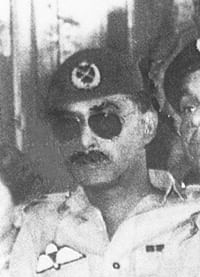History would have been different

History would have been different had Bangabandhu's government not refrained from carrying out its plan to send General Ziaur Rahman on a diplomatic posting abroad a few months before August 15, 1975.
The government did not have confidence in Zia's loyalty to it. Zia was made deputy chief of army staff but he did not have much of a command role over the army.
Bangabandhu and senior Awami League leaders considered him as a highly ambitious officer.
Zia had exposed his dream of being at the helm of state affairs in Bangladesh when as a major he first broadcast from Kalurghat Radio Station on March 27, 1971, declaring the independence of Bangladesh on behalf of Bangabandhu.
In making the declaration, he initially proclaimed himself as the president of the provisional government. Under pressure, he subsequently changed his announcement.
The government had moved to send Zia abroad as ambassador to either East Germany or Belgium. This move worried Zia. He was clearly disturbed.
He blamed General MAG Osmani, Chief of Army Staff General KM Shafiullah and Chief of General Staff General Khaled Mosharraf foras having influenced the government move.
Khaled Mosharraf was very close to Bangabandhu Sheikh Mujibur Rahman, the undisputed leader of the country. He frequently met Bangabandhu. It was perceived that he would succeed Gen Shafiullah as army chief.
In such a situation, Zia went into hectic lobbying to stop the government move from being implemented. He understood that his military career would come to an end if he was sent out on a diplomatic posting. Therefore, he sought help from his friend and course mate Lt Col MA Hamid, who was station commander of Dhaka cantonment at the time.
"Please meet Osmani and do something for me now. Otherwise, official order [on civil posting] will be issued."
Hamid had close relations with veteran freedom fighter Saidur Rahman, who was closely linked the young AL leaders Abdur Razzaque and Tofail Ahmed. Hamid met Saidur and informed him about the matter. He also introduced Zia to Saidur, younger brother of Petrobangla's first chairman Dr Habibur Rahman.
After much effort, Zia obtained an appointment through Tofail, who was political secretary to the president, to meet Bangabandhu. He convinced Bangabandhu of his loyalty to the government. The result was that the government shelved its plans of sending Zia abroad.
After the violent August 15 changeover, Gen Zia gradually emerged as the most powerful man in the country. As army chief, he became chief martial law administrator as well. But that was not the end to Zia's ambitions. His desire was to be president of Bangladesh. Major Rashid, who played a key role in controlling the Mushtaque government in 1975, said this to Hamid.
"Zia had become desperate to become president. I tried relentlessly to make him understand that he was too young to become president. I told him to wait for sometime. He was fine as the army chief.
"But Zia was desperate. Then I told him, 'Sir I cannot do it for you. You yourself will have to make your path. I will help you as much as possible'," Rashid told Hamid.
Finally, he seized the presidency on April 2, 1977, by forcing then president Justice Sayem to resign. He was only 41 when he became president. And after grabbing the presidency, he stepped into politics, ignoring his pledge to the nation that he would not do politics.
He founded the BNP. He allowed anti-liberation forces, including the Jamaat-e-Islami, to resume their political activities by withdrawing the constitutional ban on them. As part of his move to rehabilitate anti-liberation forces, he made Shah Azizur Rahman the prime minister.
Through martial law proclamations, he frequently amended the constitution, destroying its basic structures. He publicly proclaimed that he would make politics difficult for politicians. And did it.
Many years after these developments, Saidur Rahman made a sudden phone call to Col Hamid and said: "Colonel, the coups of August 15, November 3 and November 7 were staged because of you."
Hamid could not at first understand the meaning of the remarks. Saidur explained: "You used us to have Ziaur Rahman's foreign posting cancelled and that eventually turned out to be a curse. None of the three coups would take place had Zia not been here."
[The story was prepared on the basis of the work, Three Army Coups and Some Untold Tales, by Lt Col (retd) MA Hamid and some independent sources.]

 For all latest news, follow The Daily Star's Google News channel.
For all latest news, follow The Daily Star's Google News channel. 



Comments